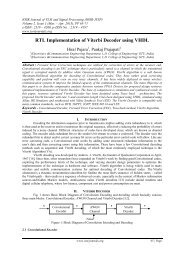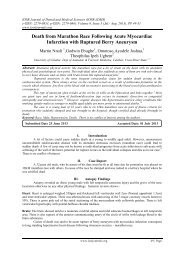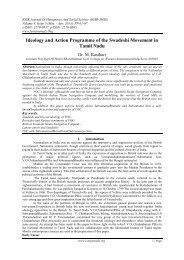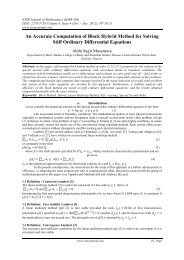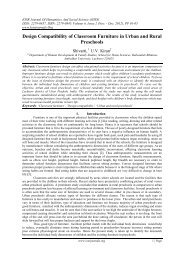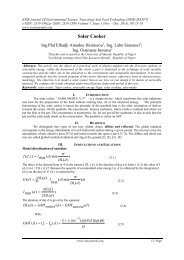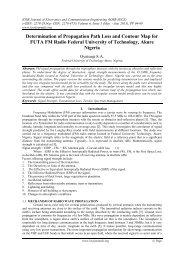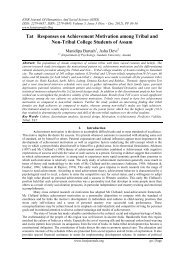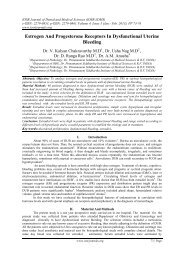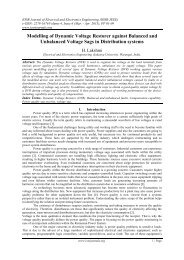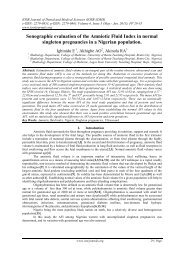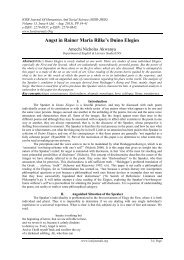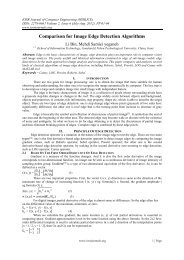Initial Conquest of India by Turks and Their Slaves - IOSR
Initial Conquest of India by Turks and Their Slaves - IOSR
Initial Conquest of India by Turks and Their Slaves - IOSR
You also want an ePaper? Increase the reach of your titles
YUMPU automatically turns print PDFs into web optimized ePapers that Google loves.
Internal Conflicts <strong>and</strong> African Development: The Nigerian Experience<br />
Hence, the multi-ethnic character <strong>of</strong> Nigerian State makes conflict even more likely, leading to an <strong>of</strong>ten-violent<br />
politicization <strong>of</strong> ethnicity. Infact, as it is now, the rival communities perceive that their security, perhaps their<br />
very survival as a corporate group, can be ensured only through control <strong>of</strong> state power. The situation has<br />
deepened since the 1980s when the federal government introduced the Structural Adjustment Programme (SAP)<br />
as a way or revamping the economy. Things got worse, largely due to insincere implementation <strong>of</strong> the economic<br />
adjustment policy (see Obasi, 1986). Consequently, many industries closed down, as they could no longer<br />
source their raw materials from the international market. This led to loss <strong>of</strong> jobs as many people were retrenched<br />
from their jobs in the “Austerity Measure” <strong>and</strong> SAP policies. Embargo was also placed on the recruitment <strong>of</strong><br />
new workers to the public service. As Albert (2005), Albert et al (1994) <strong>and</strong> Osaghae et al (1994) variously<br />
found out, it was the social dislocations (job losses, breakdown <strong>of</strong> family ties, erratic educational calendars<br />
occasioned <strong>by</strong> incessant teachers’ strikes <strong>and</strong> so on) that resulted from these, that goaded several thous<strong>and</strong>s <strong>of</strong><br />
Nigerians towards both criminal <strong>and</strong> political violence. Ethnic groups began to clash with each other as they<br />
competed aggressively for control <strong>of</strong> the limited social, economic <strong>and</strong> environmental resources within their<br />
localities. Religious groups were not left out <strong>of</strong> the melee; they started to manipulate their exclusive identities in<br />
ways that heightened social tension in the country (Albert, 2003). The situation has increased both in the extent<br />
<strong>and</strong> in the intensity <strong>of</strong> occurrence since 1999.<br />
Onyeaji (2001: 142) has noted that extreme poverty prevalent in many African states is a veritable<br />
source <strong>of</strong> civil strife. In an earlier research, Nnoli (1978) was <strong>of</strong> the opinion that politics (<strong>and</strong> their consequent<br />
conflicts) though blurred, are inter-ethnic socio economic competition. In reality he said, Nigerian politics was<br />
the struggle among various factions first to dominate the wealth in their region <strong>of</strong> origin <strong>and</strong>, second to use this<br />
regional dominance as a springboard for the acquisition <strong>of</strong> some <strong>of</strong> the non-regional wealth. In the pursuit <strong>of</strong><br />
these objectives, these petty bourgeois <strong>and</strong> comprador bourgeois leaders elicited the support <strong>of</strong> the various other<br />
classes <strong>by</strong> an appeal to ethnicity. This was why many scholars <strong>and</strong> analysts think that ethnicity was central to<br />
the course <strong>of</strong> the conflicts in Africa (Onyaji, 2001; Abdullahi, 2001; Ugbana, 1977). But since this control was<br />
not an end in itself, it was employed in the services <strong>of</strong> the leaders’ underlying political motivation, the use <strong>of</strong><br />
political power to achieve interclass economic dominance.<br />
Considering that the real people involved directly in these conflicts in Nigeria are usually youths <strong>and</strong><br />
young adults that see involvement in such group conflicts as means <strong>of</strong> ensuring their means <strong>of</strong> existence or<br />
survival in the face <strong>of</strong> harsh economy, there becomes a need to answer the question on the impact <strong>of</strong> poverty in<br />
the raging <strong>of</strong> conflicts in Nigeria.<br />
IV. Poverty <strong>and</strong> Conflicts in Nigeria<br />
One <strong>of</strong> the fundamental postulations <strong>of</strong> this work is that “there is a strong relationship between high<br />
incidence <strong>of</strong> poverty <strong>and</strong> persisting internal conflicts in Nigeria”. The intention <strong>of</strong> the work here is to find out to<br />
what extent the poverty situation has helped to generate <strong>and</strong> or sustain conflicts in Nigeria.<br />
First, it is known that African countries are poor. Infact as Onu (2003) presented it; the economic situation <strong>of</strong><br />
African Countries has always been precarious. It had 16 out <strong>of</strong> the 21 poorest countries <strong>of</strong> the world as at 2003<br />
<strong>and</strong> the situation has rather worsened instead <strong>of</strong> improving. The progressive record <strong>of</strong> African debt problems<br />
testifies to this.<br />
The situation we find in Nigeria, our case study depicts the poor conditions <strong>of</strong> African states. It has<br />
been on record that a great number <strong>of</strong> Nigerians are really living in an unprotected condition. Infact, the basic<br />
needs <strong>of</strong> life are clearly <strong>and</strong> unfortunately lacking. This situation <strong>of</strong> a<strong>by</strong>smal condition <strong>and</strong> vulnerability <strong>of</strong><br />
Nigerians is presented <strong>by</strong> Asobie (2008: 2) very palpably as thus:<br />
Poverty is at the heart <strong>of</strong> Nigerians socioeconomic problems. Poverty manifests as hunger, ill-health or poor<br />
health, illiteracy <strong>and</strong> low level <strong>of</strong> formal education. It also takes the form <strong>of</strong> inadequate housing, poor clothing,<br />
malnourished <strong>of</strong>f- springs, <strong>and</strong> even early demise … they (Nigerians) live … not really like humans. They are<br />
compelled to exist, nay vegetate, at a level that is fit more for animals, than for humans. They share the rainfilled<br />
holes, which constitute the main source <strong>of</strong> their driving water with pigs <strong>and</strong> goats, cats <strong>and</strong> dogs, ducks<br />
<strong>and</strong> fowls. They buy the left-over food items in the market: rotten tomatoes; ill preserved meat; <strong>and</strong> the hides <strong>of</strong><br />
cattle. Our people die in their thous<strong>and</strong>s every day from ignorance, disease <strong>and</strong> they eat <strong>by</strong> chance <strong>and</strong><br />
therefore survive <strong>by</strong> chance, but ultimately, they suffer with certainty, early miserable death.<br />
Under this circumstance, many people have been exposed to various forms <strong>of</strong> unimaginable social<br />
insecurity <strong>and</strong> to all sorts <strong>of</strong> social crisis both interpersonal <strong>and</strong> inter-group conflicts (Nwanegbo, 2009).<br />
There is a complete drop in the individual members’ capacity to satisfy his basic needs <strong>of</strong> food,<br />
clothing <strong>and</strong> shelter. In 2000 only 72% <strong>of</strong> urban residents <strong>and</strong> 49% <strong>of</strong> rural residents had access to safe drinking<br />
water. Only 48% <strong>of</strong> urban residents <strong>and</strong> 30% <strong>of</strong> rural residents had access to adequate sanitation. Unfortunately,<br />
the record is not improving. There is a high rate <strong>of</strong> unemployment. The NBS Report indicated that 20% <strong>of</strong><br />
people between ages 15 <strong>and</strong> 24 are unemployed. While generally, 6% <strong>of</strong> the people above 15 were unemployed<br />
(see Nwanegbo, 2009).<br />
www.iosrjournals.org<br />
26 | Page



